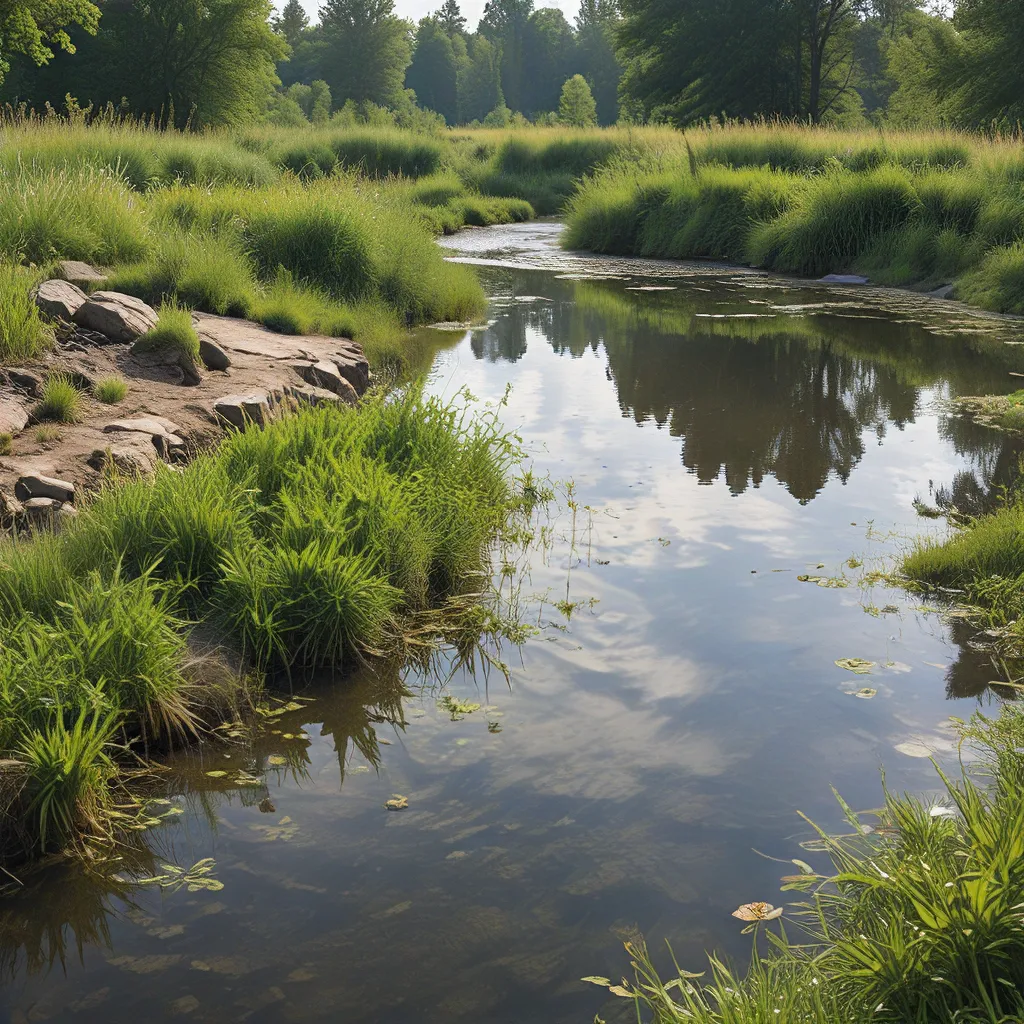
As an avid outdoorsman and nature enthusiast, I’ve always been fascinated by the intricate web of connections that exist within our natural ecosystems. It’s a delicate balance, where every element plays a vital role in sustaining the overall health and vitality of the whole. And you know what? The same principles apply to the world of wastewater management. That’s right, folks – the solutions to our water treatment challenges might just be found right in our own backyards.
Unlocking the Power of Nature-based Solutions
Let me tell you, the traditional approach to wastewater treatment has served us well for decades. But recently, there’s been a growing realization that we need to think outside the concrete-and-steel box. Enter nature-based solutions (NBS) – an innovative approach that harnesses the incredible capabilities of natural ecosystems to tackle our water challenges.
Picture this: instead of relying solely on energy-intensive mechanical systems, NBS integrates natural processes like wetlands, floodplains, and riparian buffers to purify and manage water. It’s like having a team of Mother Nature’s finest groundskeepers on the job, working tirelessly to filter out pollutants, regulate water flows, and maintain the overall health of the system.
And the benefits don’t stop there, my friends. NBS can also provide a range of additional ecosystem services, from flood control and climate regulation to habitat creation and recreational opportunities. Talk about a win-win situation! By integrating these natural elements into our wastewater management strategies, we can unlock a whole new level of efficiency, sustainability, and environmental stewardship.
Embracing the Synergies of Nature and Infrastructure
Now, I know what you might be thinking – isn’t this just a fancy way of saying we should “go green” and ditch our modern treatment plants? Well, not exactly. The truth is, nature-based solutions and traditional infrastructure can work hand-in-hand to create a more holistic and resilient approach to wastewater management.
Imagine a scenario where a constructed wetland is used to pre-treat wastewater before it reaches the main treatment facility. This natural system can remove a significant portion of pollutants, reducing the burden on the mechanical processes and improving overall efficiency. Or perhaps a floodplain restoration project can be strategically integrated to manage peak flows and prevent overflow events during heavy storms.
The key is finding the right balance and synergy between natural and engineered systems, leveraging the unique strengths of each to create a more effective and resilient solution. This integration of nature-based and traditional approaches is what sets the stage for truly transformative wastewater management.
Unleashing the Potential of Ecosystem Services
But wait, there’s more! NBS don’t just help with water treatment – they can also provide a whole host of additional ecosystem services that can benefit both the environment and our communities. Think about it – a well-designed wetland system not only filters out pollutants, but it can also regulate local climate, provide habitat for wildlife, and offer recreational opportunities for people to enjoy.
Research has shown that integrating NBS can enhance the delivery of these valuable ecosystem services, which can translate into tangible economic and social benefits for the surrounding area. For example, a restored floodplain can reduce the risk of costly flood damage, while a constructed treatment wetland can become a thriving natural sanctuary that attracts eco-tourists and outdoor enthusiasts.
It’s a symbiotic relationship where the wastewater treatment system and the surrounding ecosystem work together to create a healthier, more vibrant, and more resilient community. And let me tell you, that’s the kind of harmony I can really get behind.
Navigating the Complexities of NBS Implementation
Now, I know what you might be thinking – this all sounds great, but how do we actually make it happen? Well, my friends, that’s where things can get a bit tricky. Implementing nature-based solutions in wastewater management is no simple feat, as it requires navigating a complex web of technical, regulatory, and social considerations.
For starters, there’s the technical know-how required to design, construct, and maintain these natural systems. Experts must carefully assess site conditions, select appropriate plant species, and ensure proper hydraulic functioning – all while ensuring that the system effectively treats the wastewater to the required standards.
And then there are the regulatory hurdles to consider. Integrating NBS into existing wastewater infrastructure can sometimes clash with established policies and permitting processes, requiring close collaboration with local authorities and regulators to find the right balance.
But perhaps the biggest challenge of all is navigating the social and community dynamics that come into play. After all, these nature-based solutions are often integrated right into the heart of our neighborhoods and public spaces. Engaging with stakeholders, addressing concerns, and fostering a shared vision for the project is crucial to ensuring long-term success and community buy-in.
Embracing the Future of Wastewater Management
I know, it sounds like a lot to juggle, but trust me, the potential rewards of integrating nature-based solutions into our wastewater management strategies are well worth the effort. By leveraging the incredible power of natural ecosystems, we can create more sustainable, resilient, and environmentally-friendly water treatment systems that benefit both our communities and the natural world.
And let’s not forget, this isn’t just some pie-in-the-sky dream – NBS are already being implemented in communities around the world, showcasing their ability to deliver tangible results. From enhanced wastewater treatment to improved flood control and habitat restoration, the positive impacts of these nature-based solutions are undeniable.
So, my friends, it’s time to embrace the future of wastewater management – a future where nature and technology work in perfect harmony to create a healthier, more vibrant world for us all. Who’s with me?